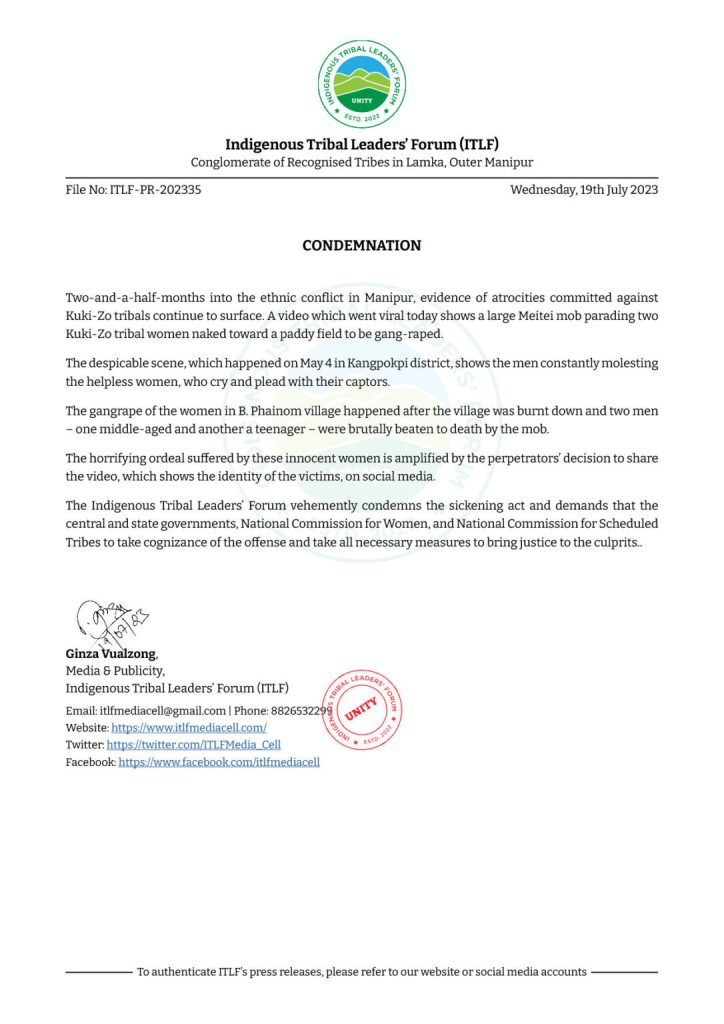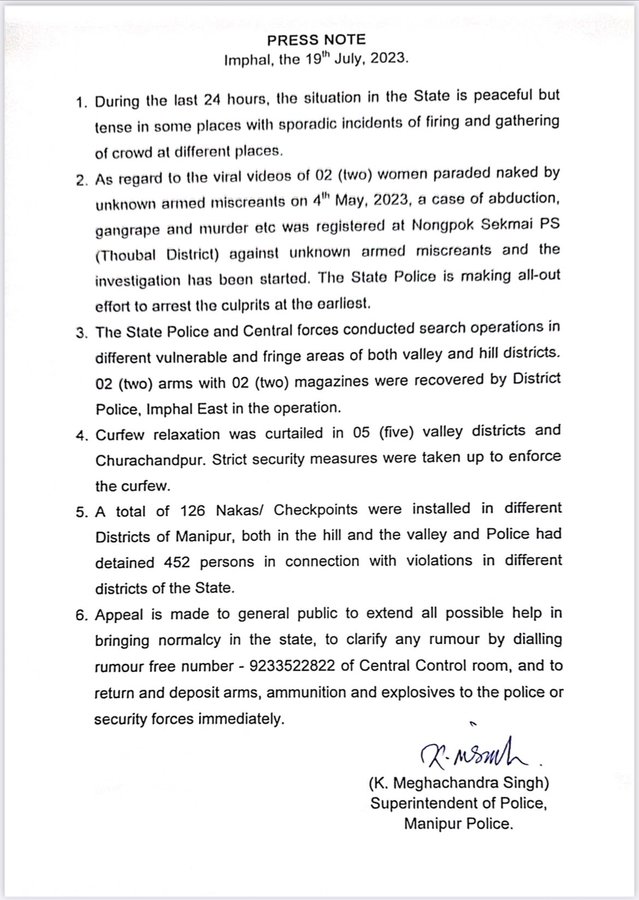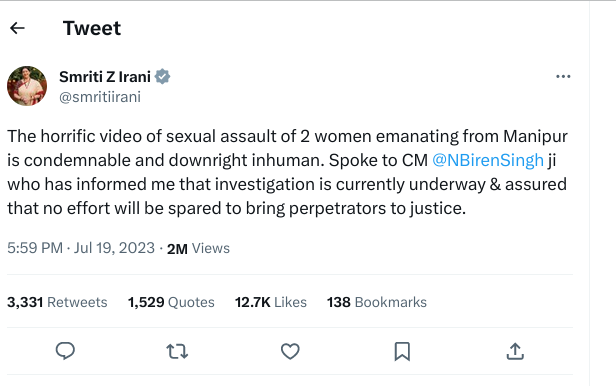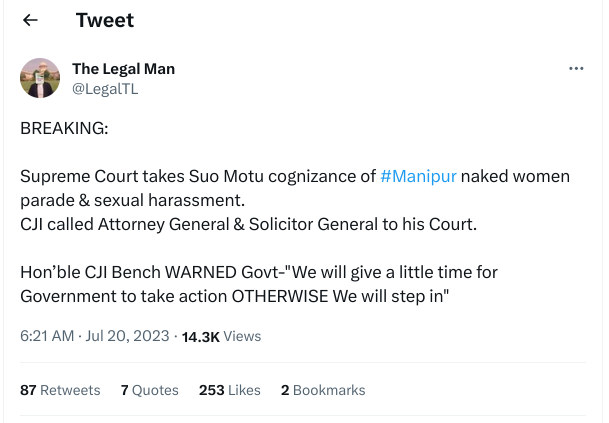Review:
Night Watch, by Terry Pratchett
| Series: |
Discworld #29 |
| Publisher: |
Harper |
| Copyright: |
November 2002 |
| Printing: |
August 2014 |
| ISBN: |
0-06-230740-1 |
| Format: |
Mass market |
| Pages: |
451 |
Night Watch is the 29th Discworld novel and the sixth Watch novel.
I would really like to tell people they could start here if they wanted
to, for reasons that I will get into in a moment, but I think I would be
doing you a disservice. The emotional heft added by having read the
previous Watch novels and followed Vimes's character evolution is
significant.
It's the 25th of May. Vimes is about to become a father. He and several
of the other members of the Watch are wearing sprigs of lilac for reasons
that Sergeant Colon is quite vehemently uninterested in explaining. A
serial killer named Carcer the Watch has been after for weeks has just
murdered an off-duty sergeant. It's a tense and awkward sort of day and
Vimes is feeling weird and wistful, remembering the days when he was a
copper and not a manager who has to dress up in ceremonial armor and meet
with committees.
That may be part of why, when the message comes over the clacks that the
Watch have Carcer cornered on the roof of the New Hall of the Unseen
University, Vimes responds in person. He's grappling with Carcer on the
roof of the University Library in the middle of a magical storm when
lightning strikes. When he wakes up, he's in the past, shortly after he
joined the Watch and shortly before the events of the 25th of May that the
older Watch members so vividly remember and don't talk about.
I have been saying recently in Discworld reviews that it felt like
Pratchett was on the verge of a breakout book that's head and shoulders
above Discworld prior to that point. This is it. This is that book.
The setup here is masterful: the sprigs of lilac that slowly tell the
reader something is going on, the refusal of any of the older Watch
members to talk about it, the scene in the graveyard to establish the
stakes, the disconcerting fact that Vetinari is wearing a sprig of lilac
as well, and the feeling of building tension that matches the growing
electrical storm. And Pratchett never gives into the temptation to
explain everything and tip his hand prematurely. We know the 25th is
coming and something is going to happen, and the reader can put together
hints from Vimes's thoughts, but Pratchett lets us guess and sometimes be
right and sometimes be wrong. Vimes is trying to change history, which
adds another layer of uncertainty and enjoyment as the reader tries to
piece together both the true history and the changes. This is a masterful
job at a "what if?" story.
And, beneath that, the commentary on policing and government and ethics is
astonishingly good. In a review of an earlier Watch novel, I
compared Pratchett to Dickens in the way that
he focuses on a sort of common-sense morality rather than political
theory. That is true here too, but oh that moral analysis is sharp enough
to slide into you like a knife. This is not the Vimes that we first met
in
Guards! Guards!. He has has turned
his cynical stubbornness into a working theory of policing, and it's
subtle and complicated and full of nuance that he only barely knows how to
explain. But he knows how to show it to people.
Keep the peace. That was the thing. People often failed to
understand what that meant. You'd go to some life-threatening
disturbance like a couple of neighbors scrapping in the street over
who owned the hedge between their properties, and they'd both be
bursting with aggrieved self-righteousness, both yelling, their wives
would either be having a private scrap on the side or would have
adjourned to a kitchen for a shared pot of tea and a chat, and they
all expected you to sort it out.
And they could never understand that it wasn't your job. Sorting it
out was a job for a good surveyor and a couple of lawyers, maybe.
Your job was to quell the impulse to bang their stupid fat heads
together, to ignore the affronted speeches of dodgy
self-justification, to get them to stop shouting and to get them off
the street. Once that had been achieved, your job was over. You
weren't some walking god, dispensing finely tuned natural justice.
Your job was simply to bring back peace.
When Vimes is thrown back in time, he has to pick up the role of his own
mentor, the person who taught him what policing should be like. His
younger self is right there, watching everything he does, and he's
desperately afraid he'll screw it up and set a worse example. Make
history worse when he's trying to make it better. It's a beautifully
well-done bit of tension that uses time travel as the hook to show both
how difficult mentorship is and also how irritating one's earlier naive
self would be.
He wondered if it was at all possible to give this idiot some lessons
in basic politics. That was always the dream, wasn't it? "I wish I'd
known then what I know now"? But when you got older you found out
that you now wasn't you then. You then was a twerp.
You then was what you had to be to start out on the rocky road of
becoming you now, and one of the rocky patches on that road was being
a twerp.
The backdrop of this story, as advertised by the map at the front of the
book, is a revolution of sorts. And the revolution does matter, but not
in the obvious way. It creates space and circumstance for some other
things to happen that are all about the abuse of policing as a tool of
politics rather than Vimes's principle of keeping the peace. I mentioned
when reviewing
Men at Arms that it was
an awkward book to read in the United States in 2020. This book tackles
the ethics of policing head-on, in exactly the way that book didn't.
It's also a marvelous bit of competence porn. Somehow over the years,
Vimes has become extremely good at what he does, and not just in the
obvious cop-walking-a-beat sort of ways. He's become a leader. It's not
something he thinks about, even when thrown back in time, but it's
something Pratchett can show the reader directly, and have the other
characters in the book comment on.
There is so much more that I'd like to say, but so much would be spoilers,
and I think
Night Watch is more effective when you have the
suspense of slowly puzzling out what's going to happen. Pratchett's
pacing is exquisite. It's also one of the rare Discworld novels where
Pratchett fully commits to a point of view and lets Vimes tell the story.
There are a few interludes with other people, but the only other
significant protagonist is, quite fittingly, Vetinari. I won't say
anything more about that except to note that the relationship between
Vimes and Vetinari is one of the best bits of fascinating subtlety in all
of Discworld.
I think it's also telling that nothing about
Night Watch reads as
parody. Sure, there is a nod to
Back to the Future in the
lightning storm, and it's impossible to write a book about police and
street revolutions without making the reader think about
Les
Miserables, but nothing about this plot matches either of those stories.
This is Pratchett telling his own story in his own world,
unapologetically, and without trying to wedge it into parody shape, and it
is so much the better book for it.
The one quibble I have with the book is that the bits with the Time Monks
don't really work. Lu-Tze is annoying and flippant given the emotional
stakes of this story, the interludes with him are frustrating and out of
step with the rest of the book, and the time travel hand-waving doesn't add
much. I see structurally why Pratchett put this in: it gives Vimes (and
the reader) a time frame and a deadline, it establishes some of the ground
rules and stakes, and it provides a couple of important opportunities for
exposition so that the reader doesn't get lost. But it's not good story.
The rest of the book is so amazingly good, though, that it doesn't matter
(and the framing stories for "what if?" explorations almost never make
much sense).
The other thing I have a bit of a quibble with is outside the book.
Night Watch, as you may have guessed by now, is the origin of the
May 25th Pratchett memes that you will be familiar with if you've spent
much time around SFF fandom. But this book is dramatically different from
what I was expecting based on the memes. You will, for example see a lot
of people posting "Truth, Justice, Freedom, Reasonably Priced Love, And a
Hard-Boiled Egg!", and before reading the book it sounds like a
Pratchett-style humorous revolutionary slogan. And I guess it is, sort
of, but, well... I have to quote the scene:
"You'd like Freedom, Truth, and Justice, wouldn't you, Comrade
Sergeant?" said Reg encouragingly.
"I'd like a hard-boiled egg," said Vimes, shaking the match out.
There was some nervous laughter, but Reg looked offended.
"In the circumstances, Sergeant, I think we should set our sights a
little higher "
"Well, yes, we could," said Vimes, coming down the steps. He glanced
at the sheets of papers in front of Reg. The man cared. He really
did. And he was serious. He really was. "But...well, Reg, tomorrow
the sun will come up again, and I'm pretty sure that whatever happens
we won't have found Freedom, and there won't be a whole lot of
Justice, and I'm damn sure we won't have found Truth. But it's just
possible that I might get a hard-boiled egg."
I think I'm feeling defensive of the heart of this book because it's such
an emotional gut punch and says such complicated and nuanced things about
politics and ethics (and such deeply cynical things about revolution).
But I think if I were to try to represent this story in a meme, it would
be the "angels rise up" song, with all the layers of meaning that it gains
in this story. I'm still at the point where the lilac sprigs remind me of
Sergeant Colon becoming quietly furious at the overstep of someone who
wasn't there.
There's one other thing I want to say about that scene: I'm not naturally
on Vimes's side of this argument. I think it's important to note that
Vimes's attitude throughout this book is profoundly, deeply conservative.
The hard-boiled egg captures that perfectly: it's a bit of physical
comfort, something you can buy or make, something that's part of the
day-to-day wheels of the city that Vimes talks about elsewhere in
Night Watch. It's a rejection of revolution, something that Vimes
does elsewhere far more explicitly.
Vimes is a cop. He is in some profound sense a defender of the status
quo. He doesn't believe things are going to fundamentally change, and
it's not clear he would want them to if they did.
And yet. And yet, this is where Pratchett's Dickensian morality comes
out. Vimes is a conservative at heart. He's grumpy and cynical and jaded
and he doesn't like change. But if you put him in a situation where
people are being hurt, he will break every rule and twist every principle
to stop it.
He wanted to go home. He wanted it so much that he trembled at the
thought. But if the price of that was selling good men to the night,
if the price was filling those graves, if the price was not fighting
with every trick he knew... then it was too high.
It wasn't a decision that he was making, he knew. It was happening
far below the areas of the brain that made decisions. It was
something built in. There was no universe, anywhere, where a Sam
Vimes would give in on this, because if he did then he wouldn't be Sam
Vimes any more.
This is truly exceptional stuff. It is the best Discworld novel I have
read, by far. I feel like this was the Watch novel that Pratchett was
always trying to write, and he had to write five other novels first to
figure out how to write it. And maybe to prepare Discworld readers to
read it.
There are a lot of Discworld novels that are great on their own merits,
but also it is 100% worth reading all the Watch novels just so that you
can read this book.
Followed in publication order by
The Wee Free Men and later,
thematically, by
Thud!.
Rating: 10 out of 10
 After many years of effort, I am happy to announce that
After many years of effort, I am happy to announce that 
 But part of it has been neglect as well as this time
But part of it has been neglect as well as this time 






